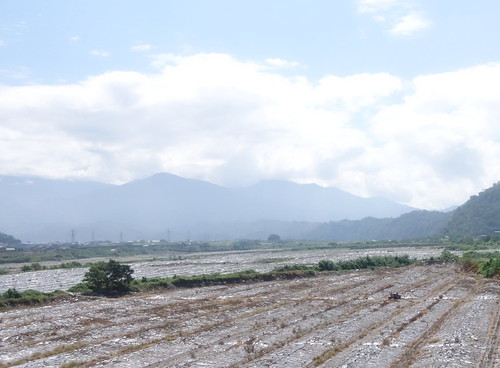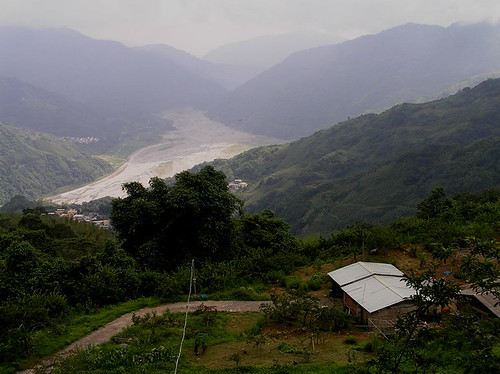Formosa Chewing tobacco c. 1872
There I was, surfing the net, when I came across this little note:
U. S. Grant.
Washington City, April 13, 1869.
To the Senate of the United States:
I nominate Capt. James Forney, of the Marine Corps, to be brevet major in said corps for gallantry in action against the savages of Formosa, to date from the 13th of June, 1867.
Marines in action against the "savages of Formosa"? James Forney later became
a civil war hero and rose to high rank in the marines before being court martialed for corruption, but the incident to which this citation refers is one of those fascinating little moments in 19th century imperialism, when a punitive expedition was driven off in defeat.
On March 12, 1867, the American merchant ship
Rover hit a reef near Oluanpi, Taiwan's southernmost point, and drifted north towards what is now Kenting. The ship soon sank, but the Captain, his wife, and the crew got off in small boats. In revenge for previous killings of local aborigines by foreigners, the local aborigines (called the Koaluts at the time) killed everyone who made it to shore, excepting one Chinese sailor. That sailor found his way to Takao (Kaohsiung), where he notified the British consul, who in turn notified the British ambassador in Beijing, who passed the information along to the US ambassador there.
The British dispatched a gunboat from Taiwanfu (Tainan) in late March to search for survivors. The aborigines descended on the sailors searching the area, driving them back to the ship, which responded by shelling them, and then leaving.
Early in April of 1867 the US Consul in Amoy, Charles William Le Gendre, traveled to Foochow to see whether he could persuade the Qing authorities to act. The governor-general gave Le Gendre a letter of introduction to the Qing official in Taiwanfu (Tainan). Le Gendre arrived in Taiwan on April 18, where Qing authorities evinced little interest in the incident. They told Le Gendre that the aboriginal districts lay outside their authority.
Hartford in 1864.
Months went by as diplomatic messages were exchanged, and finally on June 13, 1867, two ships,
Hartford and
Wyoming, along with 181 officers, sailors and marines, were dispatched by the Americans to punish the "savages", accompanied by the British consul at Takao and a couple of British citizens. Davidson complains that this was far too late, since even if some Americans had survived, it would be unlikely that any were still alive after so long a delay.
Alas for the Americans, the punishment was meted out to them. The marines and sailors landed on June 13th. The heat was overwhelming and the troops were felled by sunstroke and exhaustion. "The savages," wrote the commander of the land expedition, "dressed in clouts, their bodies painted red, were seen through our glasses, assembling in parties of ten or twelve on the cleared hills about two miles distant." The aborigines sensibly fought from cover on a hill above the Americans, remaining invisible to the American force but keeping the sailors and marines under constant musket fire. "It was impossible to tell the position of the enemy until we saw the smoke of his pieces, and we were obliged to fire at the flash. We were in plain sight, an open mark for the enemy, while they were hid in this undergrowth, into which we could not see ten feet," complained one of the officers in the NY Times. Forney was in charge of skirmishers deployed in front of the US troops in this battle.
 "Attack of the United States marines and sailors on the pirates of the island of Formosa, East Indies."
"Attack of the United States marines and sailors on the pirates of the island of Formosa, East Indies."
After several hours of plunging into ambush, the first battle casualty occurred when Alexander Slidell McKenzie, second in command of the expedition, was killed leading a charge uphill against the aborigines. Despite the Sharp's rifles that half the company possessed (aborigines in southern Formosa had fled from volleys of the new breech-loading rifles of the Prussian steamer
Elbe in 1860, the first use of the revolutionary new Prussian weapon in combat), they were unable to drive off the locals. Instead, the "Pirates of Formosa" as they were styled in the NY Times, had driven off the expedition in defeat and disarray. The retreating Americans made up for the defeat by burning a few huts on their way back to their ships.
The aborigines, observed the US ground commander, displayed "a strategem and courage equal to our native indians." Davidson's comment on the incident summarizes the attitude that underlies 200 years of American intervention in foreign lands: "After this ineffectual attempt to bring the Koaluts to reason...."
 A. S. McKenzie, killed in the skirmish.
A. S. McKenzie, killed in the skirmish.
Rear-Admiral Bell reported that it seemed unlikely the area could be stabilized unless a Power was willing to create a settlement there to pacify the area, but the Qing appeared reluctant to do so.
A second attempt to "reason" with the aborigines was made by Le Gendre. In September of 1867 he arrived in person on Formosa to take charge of a punitive expedition with a large force, which the Qing Viceroy had promised to send. Arriving with orders in hand from the Qing authorities in China, he compelled the Qing general on Formosa in charge of the island's troops to supply him with the troops, though only 500 of the promised 1,000 were delivered, and off he marched into southern Taiwan.
Le Gendre had been a general in the civil war and was an experienced leader of troops as well as an experienced diplomat. He basically assumed control of the expedition from the Qing general in charge, and led it on an exemplary march across hill and dale, road building along the way, entirely free of violent encounters. Davidson reproduces his expedition report in its entirety, well worth reading. For example:
"We spent the night in a sugar mill, and left at daylight for Pangliau, which we reached the same night. Pangliau extends along the shore at the summit of an arc of a circle, forming a bay, and is, therefore, too open to be secure. The products are rice and peanuts. Women pound the rice and till the fields, while the men are entirely taken up with fishing. To the east, at a cannon shot from the sea, rise abruptly from the valley, high mountains, the exclusive domain of the savage aborigines, who receive from the Chinese (or half-caste) population a certain share of their crops, as a royalty for the lands they have rented to them forever. There for the first time we notice that none leave the village without being armed."
This sounds like a description of modern Fangliao. It is interesting that Le Gendre records that the locals paid the aborigines "rent" which sounds suspiciously like a Dangeld. While they waited at Pangliau two Englishmen showed up. They would be indispensible in Le Gendre's later negotiations.
Why did they wait at Pangliau? They were having a road built over the mountains, which they promptly set out on once it was completed. Despite predictions of imminent attack, the expedition skillfully blocked the local passes with troop detachments and proceeded unmolested into the aboriginal demenses.
Le Gendre proved himself equal to the daunting tasks before him. He recognized that retaliation was pointless and it would be better to obtain a promise of future protection of shipwreck victims from the local aborigines, which he described as consisting of 18 tribes led by a paramount leader named Tooke-tok. It was US policy, he wrote, “to sacrifice a vain revenge (which might be hereafter used as a pretext for retaliation) to the incomparable advantage we would gain in securing ourselves against the recurrence of crimes we had come to punish.” Le Gendre also realized that the aborigines, far from acting out of some savage preference for violence, were aggrieved parties retaliating for attacks on them by foreigners. Finally, the large body of troops he had brought represented muscle that could be deployed in punishment should negotiations break down or agreements be broken.
Le Gendre was able to negotiate an agreement which Davidson avers saw attacks on shipwreck victims in the vicinity fall. This agreement included a provision calling for the Qing to build a "fortified observatory at the southern bay" which would eventually evolve into the walled lighthouse at Oluanpi. Le Gendre saw a fort in the area as an urgent necessity which would enabled the Qing to assert their authority over the area, command respect from the Koaluts, and provide a safe haven for the many victims of shipwrecks in the area. In response to Le Gendre's demands, the Qing General Liu erected a walled enclosure in area in just two days.
Davidson records that the mission was successful and that the local aborigines often helped shipwreck victims and notified the Qing authorities of their existence. But the "confederation" of local peoples fell apart -- if indeed it had ever existed -- and Tooke-tok found it difficult to exert his authority, records Davidson.
After "a hard trip of nearly two months", Le Gendre returned to Amoy. In 1874 he would return to the area with a Japanese punitive expedition as its advisor, along with several other Americans. The Japanese were sent to punish the aborigines for the murder of 54 Okinawan sailors by aborigines of the Mudan area in 1871. The enterprise was doubly colonialist, first against the aborigines, and second, against Okinawa. By "avenging" those deaths, the Japanese would demonstrate that they spoke for and acted on behalf of, the Okinawans as their rulers. That expedition would lead to the famous Battle of the Stone Gate, not far from modern Checheng. But that is a story for another day.
REFS:
This great blogpost,
NYTimes, Davidson,
Wiki,
here.
_______________________
[Taiwan] Don't miss the comments below! And check out my blog and its sidebars for events, links to previous posts and picture posts, and scores of links to other Taiwan blogs and forums! Delenda est, baby.








